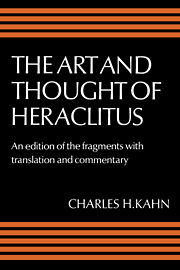 The Art and Thought of Heraclitus
The Art and Thought of Heraclitus General introduction
Published online by Cambridge University Press: 26 February 2010
Summary
The Man, the Time, and the Place
The details of Heraclitus' life are almost completely unknown. Reliable information is limited to the fact that he was a native of Ephesus, on the coast of Asia Minor north of Miletus, and that his father's name was Bloson. His approximate date is fixed by a synchronism with the reign of Darius, 521 to 487 B.C.; his traditional ‘acme’ in the 69th Olympiad, 504–501 B.C., is probably nothing more than a simplified version of the same synchronism. The rough accuracy of this date, on the threshold of the fifth century, is guaranteed by fragment XVIII (D. 40), where Pythagoras, Xenophanes, and Hecataeus are cited as older contemporaries or figures of the recent past. All three men seem to have died between 510 and 480 B.C. The book dates itself, then, in or near this period. The same approximate date could be inferred from the presence or absence of various philosophical influences: there are clear debts to the sixth-century Milesians, to Pythagoras and Xenophanes, but none to Parmenides or to any thinker of the fifth century.
The ‘life’ of Heraclitus by Diogenes Laertius is a tissue of Hellenistic anecdotes, most of them obviously fabricated on the basis of statements in the preserved fragments. (The unusually disgusting reports of his final illness and death reveal a malicious pleasure in mocking a figure whom the Stoics venerated as the source of their own philosophy.) Suggestive, if not entirely credible, are the stories which describe Heraclitus as refusing to engage in politics or to legislate for Ephesus, in sharp contrast with the public activities of most early philosophers.
- Type
- Chapter
- Information
- The Art and Thought of HeraclitusA New Arrangement and Translation of the Fragments with Literary and Philosophical Commentary, pp. 1 - 24Publisher: Cambridge University PressPrint publication year: 1979


